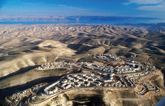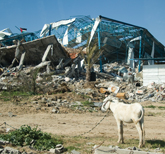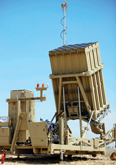

Mark Twain said, “If you don't read the newspaper, you're uninformed. If you read the newspaper, you're misinformed.” This is so true for the most complex societal issue of our time, commonly called {image_2}“The Israeli–Palestinian Conflict.” We are bombarded daily with phrases like cycle of violence, occupation, two-state solution, Palestinian refugees, illegal settlements, roadblocks to peace, Palestinian territory, and apartheid wall in the mainstream news media. Without an informed context in which to interpret these terms, the average news recipient remains woefully ill informed and swayed toward an international media bias against Israel.
Continue Reading »
{image_1}A special commission named this year by Prime Minister Benjamin Netanyahu has submitted some clear-cut conclusions regarding the legality of the so-called “Israeli settlements”. The three-member committee, informally known as the Levy Commission—headed by former Supreme Court Justice Edmond Levy, along with former Foreign Ministry Legal Advisor Alan Baker, and former Deputy President of the Tel-Aviv District Court Tehiya Shapira—determined that these settlements are perfectly legal within the standards of international law.
Continue Reading »
{image_3}With Syria overcome by violence, Jordanian King Abdullah has expressed the fear that sectarianism in Syria could lead to a fragmentation of the country. And that’s not the only regional fear. A sizable Syrian stockpile of chemical weapons also looms as a very real threat—both within the nation and out of it.
Continue Reading »
{image_1}If we were to review a list of Israel’s actions that have incurred the wrath of the nations, it would actually be hard to decide which should be ranked at the top. Certainly in the running would be the decision, over a decade ago, to build a security fence, the largest infrastructure project in Israel’s history. Developed specifically to protect citizens from the infiltration of suicide bombers after years of intifada (Arab uprisings)—which left 1,226 Israelis dead and 8,341 maimed— the cost was nearly US $2 billion.
Continue Reading »
{image_1}Perhaps no single place on earth is so misrepresented as the Gaza Strip. On September 12, 2005, the last of the Israeli soldiers and civilians left the Strip after 38 years. Not a Jew remained. Even the bodies in the Jewish graveyards were removed and reburied in Israel.
Continue Reading »
{image_1}Throughout their history, regardless of where they have lived, the Jewish people have been blamed for everything from the plague to the high cost of automobile insurance. They have been accused of poisoning wells, intentionally spreading the HIV virus, killing Christian children to use their blood to make Passover matzah (unleavened bread), and attempting to take over the world through their alleged control of its finances. No matter how ludicrous some of these may sound, there have always been anti-Semites at hand ready to believe the current rhetoric and incite the local populations to hatred, violence, and even murder.
Continue Reading »
{image_1}Turmoil in the Middle East has captured the attention of the entire world over the past year as nation after nation has experienced uprisings among its citizens. Called the “Arab Spring,” some thought these events might lead to a democratic Middle East with a more positive disposition toward the West. Unfortunately, that was not to be. Although much of this unrest may have begun with a sincere desire for positive change, the nations responded in very different ways. From programs that provided people with generous financial benefits to military action, each nation has struggled to find stability. And radical Islamists were on hand to take advantage of every opportunity.
Continue Reading »
{image_1}Israel has had to adapt to many threats and challenges: from tanks to terrorists, from plane hijackers to missile launchers. And that work never ends. Israel’s Home Front Command, a division of the Israel Defense Forces (IDF), has an ongoing role to prepare Israel’s civilians for a wide range of dangers. Included among those are nonconventional attacks such as chemical, biological, and nuclear threats.
Continue Reading »
{image_1}The “Color Red” alert siren sounds as another terrorist missile heads towards the coastal city of Ashdod in Israel’s south. More than 200,000 Israelis are at risk. Cars, businesses, homes, schools, synagogues—any one of them could be the target for the blindly-fired Gaza rocket. An explosion is heard by people in the city, but there’s no shattered glass, blazing buildings, or injuries. The Iron Dome missile defense system has successfully managed to intercept the incoming projectile, literally blowing it out of the sky with a missile of its own.
Continue Reading »
{image_1}At the outset of 2012, irrespective of the Arab–Israeli conflict and the Palestinian issue, the defining geopolitical and religious schism in the Middle East is boiling, exacerbating violent intra-Muslim fragmentation—religious, tribal, ideological, and geographical.
Continue Reading »All logos and trademarks in this site are property of their respective owner. All other materials are property of Bridges for Peace. Copyright © 2025.
Website Site Design by J-Town Internet Services Ltd. - Based in Jerusalem and Serving the World.